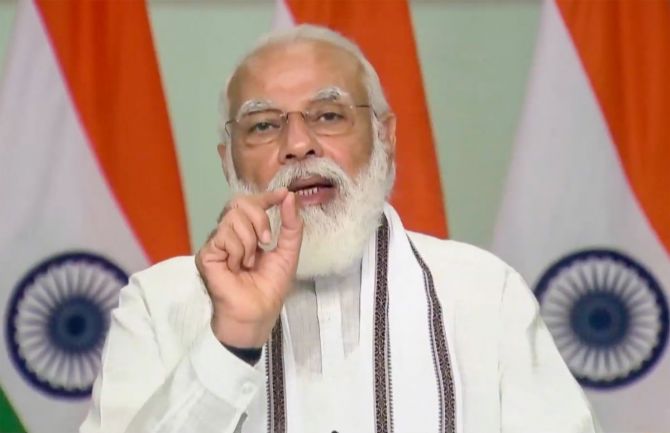Prime Minister Narendra Modi on Friday said the new National Education Policy (NEP) is not just a circular and its implementation will be like a 'mahayagya' which will need strong determination and collective efforts from all stakeholders.

Referring to the policy as the foundation of the 'new India', he said the NEP focusses on 'how to think', while the country's education system so far emphasised on 'what to think'.
"The new education policy is not just a circular. The job doesn't end with the notification of the policy, it has to be successfully implemented, for which a strong determination is needed from everyone.
"This is like a 'mahayagya' for building the present and future of the country," Modi said.
He made the remarks while delivering the inaugural address at the 'Conclave on Transformational Reforms in Higher Education under National Education Policy' via a video link.
The conclave is being organised by the Ministry of Human Resource Development (HRD) and the University Grants Commission (UGC).
"The NEP has given rise to a healthy debate and the more we discuss and debate the more it will benefit the education department. It is palpable that questions will arise on how this huge plan will be implemented. We all will together implement it," the prime minister said.
"Each one of you is directly involved in the implementation of the NEP. In terms of political will, I am totally committed and with you," he said.
"A new round of dialogue and coordination with universities, colleges, school education boards, different states, different stakeholders is about to start from here.
"I am confident that in this conclave, better suggestions, effective solutions will come out regarding effective implementation of NEP," he added.
Modi said there have been no major changes in the country's education system in recent years. As a result, instead of promoting curiosity and imagination, the country moved towards herd mentality.
"The mapping of interest, ability, and demand was needed. We need to develop critical thinking and innovative thinking abilities in our youths. It will be possible if we have purpose, philosophy, and passion of education," he said.
"Till now, we have focussed on what to think, but NEP 2020 focuses on how to think.
"At a time when there is a flood of information and content, it is important that we know which information is necessary and which is not. We need inquiry-based, discovery-based, and analysis-based modes of teaching.
"This will increase the interest to learn and participate in class," he said.
The NEP, which was approved by the Union Cabinet at a meeting chaired by the prime minister last week, replaces the 34-year-old National Policy on Education framed in 1986.
It is aimed at paving the way for transformational reforms in school and higher education systems to make India a global knowledge superpower.
Modi said it is a matter of happiness that after the introduction of the NEP no region or section has said that it is biased, or leaning towards one side.
"We are also trying to ensure that the talent of India stays in India and works for the development of the generations to come," he said.
The NEP allows top-ranking institutes of the world to set up campuses in India.
Earlier, the HRD Ministry had introduced several initiatives under the 'Study in India' program.
"India is split on the topic of autonomy. One school of thought says that the government should have the say in educational institutes, while the other believes every institute should have freedom.
"The way to quality education goes from between both these schools of thought," the prime minister said.
"The institutes which will work more on quality education will be given more freedom as a reward. This will improve the quality and encourage higher education institutes to grow," he said.
Modi said the NEP also reflects the ideals of Guru Rabindranath on education which aim at bringing human lives in harmony with all the existence.
"A holistic approach was needed, which the National Education Policy has achieved successfully. The policy was formulated keeping in mind two biggest questions -- Whether our education system motivates our youth for a creative, curiosity and commitment-driven life? Whether our education system empowers our youth, helps in building an empowered society in the country?" he said.
The PM said the dignity of every section of society plays a big role in the development of any country.
"Therefore, a lot of attention has been given to student education and dignity of labour in the National Education Policy. India has the ability to give talent and technology solutions to the whole world.
"The policy also addresses this responsibility, which is aimed at developing technology-based content and courses," he said.
The conclave will have sessions dedicated to significant aspects of education covered under the new NEP, including holistic, multidisciplinary and futuristic education, quality research and equitable use of technology for better reach in education.











 © 2025
© 2025